Feasibility Studies Funded Projects
Round 1
Please use the links in the navigation above to access individual case studies. Summaries of each project are provided below:
Awarded to Dr Chris Davey, Cranfield UniversityWastewater derived ammonia: contaminant to carbon free transportation fuelThis project will introduce an entirely new route to supporting UK transport in achieving net carbon zero. Utilising innovative thermal separation technology developed at Cranfield University, this work led by Dr Chris Davey will experimentally demonstrate the link between the selective recovery of ammonia from wastewater and its use in fuel cells for alternative fuel vehicles. The presence of trace impurities within the enriched ammonia product will be investigated and their potential impact on energy generation characterised, to inform any engineering interventions demanded to improve the wastewater derived ammonia fuel before utilisation. The industrial steering group will include representatives from Severn Trent Water, Northumbrian Water, Anglian Water, and a special adviser from Waste & Resources Action Programme (WRAP). CENTS Mentor: Prof Kerry Kirwan |
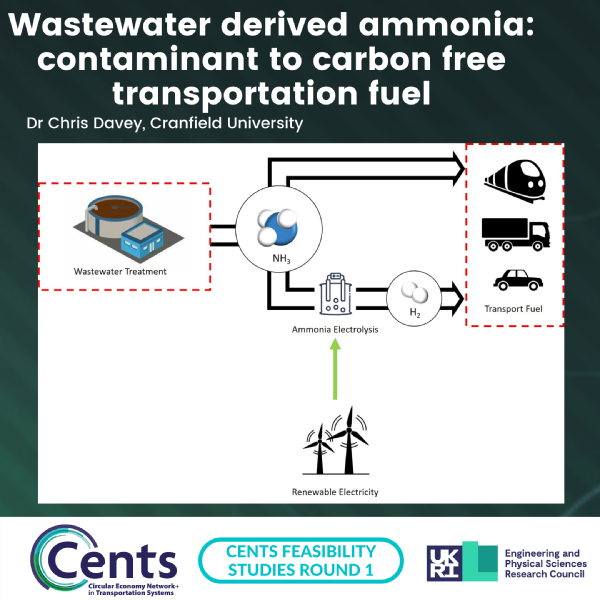 |
Awarded to Dr Carolin Kresse and Dr Pierre Josso, British Geological SurveyLearning from history: The impact of extreme shocks on raw material supply chains for the transport manufacturing sectorWith different countries at varying stages in the lockdown cycle, the scale and duration of the impact of COVID-19 disruption to raw material supply to the UK economy remains unclear. Using one of the world’s largest databases on mineral production and trade, a research team led by Dr Carolin Kresse at the British Geological Survey will examine the short- and medium-term effects of historical shocks on the supply chains of metals critical to the transport sector (Aluminium, Nickel, Cobalt). The project aims to identify risks of supply disruption during future periods of instability by unravelling complex raw material supply networks, and will work with industry and policy stakeholders to develop mitigation strategies to reduce dependence on imports and to adopt more circular approaches. CENTS Mentors: Prof Mark Jolly and Dr Evi Petavratzi |
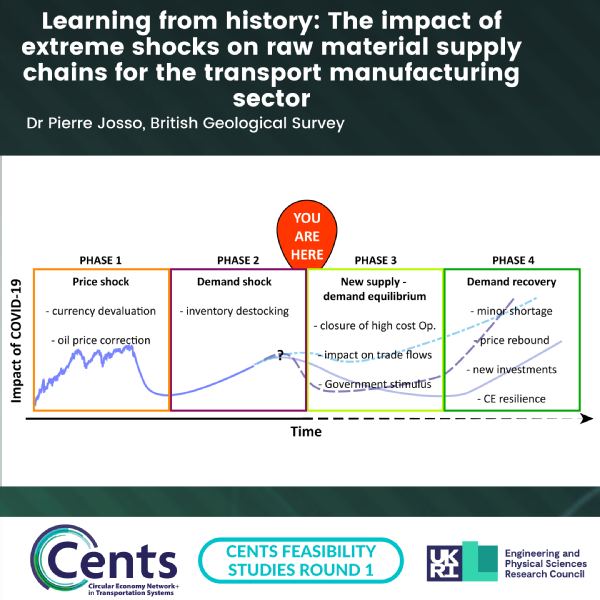 |
Awarded to Dr Vannessa Goodship, Warwick Manufacturing GroupSMART and Sustainable CoatingsIn the move towards light weighting and the circular economy (CE), thermoplastic composites in transport are becoming increasingly attractive. However, the thermoset coatings traditionally applied for these applications cause subsequent problems for thermoplastic recycling systems. Therefore, to address this issue, this research collaboration between the University of Warwick and the University of Exeter looks at both academic developments in the coating industry and potential implementation strategies for industry in the circular economy. This is with a view to develop an initial CE Roadmap for Thermoplastic Surface Coatings in Transport. CENTS Mentor: Prof Kerry Kirwan |
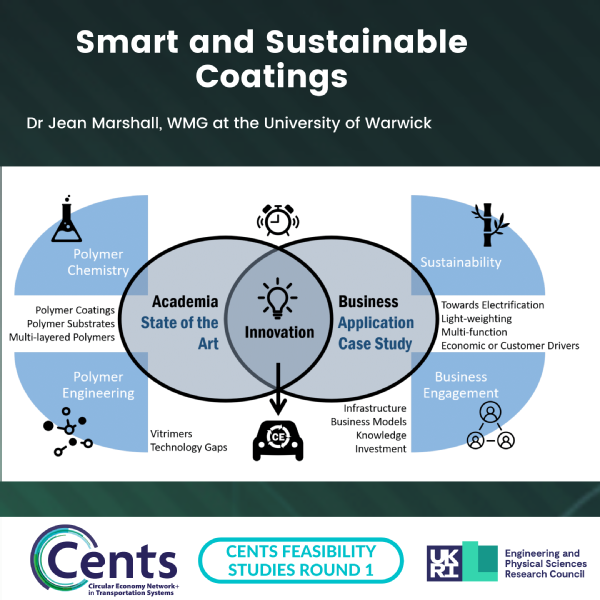 |
Awarded to Dr David Butler, University of StrathclydeIdentifying the Potential for Zero Waste Decommissioning of Commercial AircraftWith COVID19 having a major impact on air travel, airlines have already begun to retire more aircraft. After an initial period in storage these aircraft will be decommissioned with parts either being reused, scrapped or repurposed. To achieve a higher utilisation of components (smart dismantling) will require a shift beyond the traditional aerospace sector and a look at opportunities for other industries to up-cycle parts or material. The project will be led by a team led by Dr David Butler at the University of Strathclyde. Industry support will be provided by Chevron Aerospace who have a wealth of experience with decommissioning aircraft. Desired outputs will consist of a report covering the current industry landscape and supply chain, the gaps and a strategy to move forward to 100% reuse. CENTS Mentors: Prof Mark Jolly and Dr Evi Petavratzi |
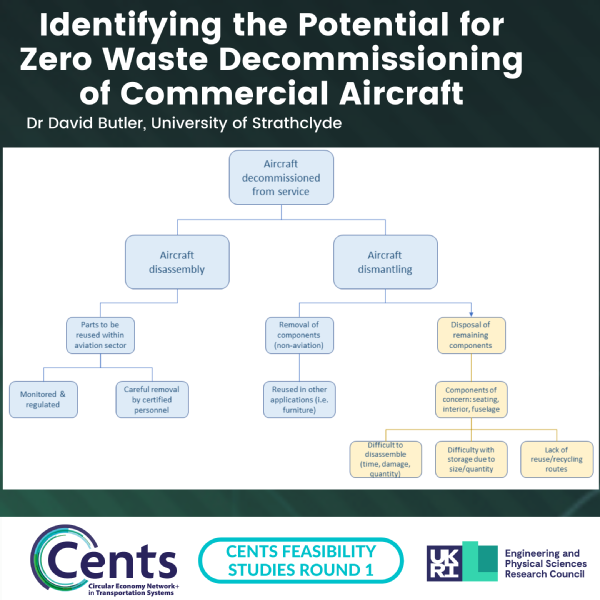 |
Awarded to Dr Artur Grisanti Mausbach, Royal College of ArtEcofitting – whole-life design upgrading cars to zero emissionsThe Ecofitting feasibility study led by Dr Artur Grisanti Mausbach at the Royal College of Art will investigate whole-life design to customise and upgrade cars to zero emissions. The project will determine the state-of-the-art of retrofitting and customising, exploring their cultural, environmental, and social-economic foundations. The research will also delve into industry products trends, impacts of incentives, urban planning policies, new legislation and new technologies standards. CENTS Mentor: Prof Steve Evans |
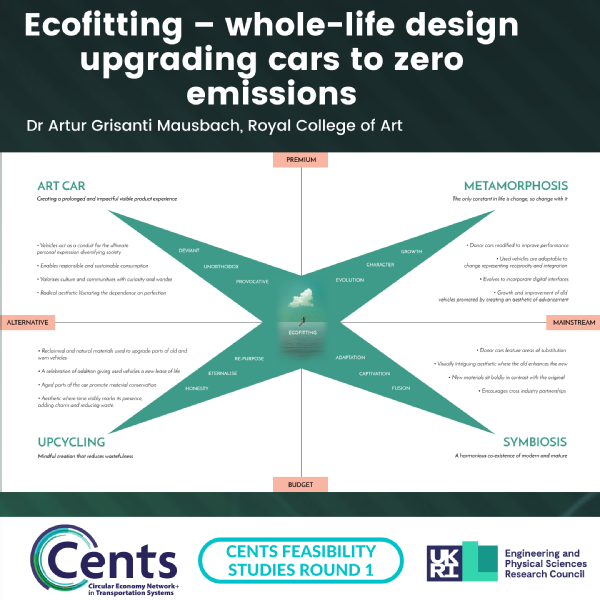 |
Awarded to Prof Mohamed Osmani, Loughborough UniversityCircular Materials for Transportation Machines (CIRCMATE-4-TMs)CIRCMATE-4-TMs will seek to enable transformative change to transportation machines’ (TMs) resource efficiency, with creation of economic value from minimising the use of raw materials, waste and energy and progress towards the United Nations SDGs. This involves developing a holistic and interdisciplinary approach to advance the circularity of materials used in TMs supply chains across the four principal modes: automobiles, trains, aircrafts and ships. Commonalities across the four TMs sectors will be characterised at a high level, identifying synergies to determine systematic enablers to accelerate the shift from a linear to a circular economy (CE) in the TMs material sector.
CENTS Mentor: Prof Richard Murphy |
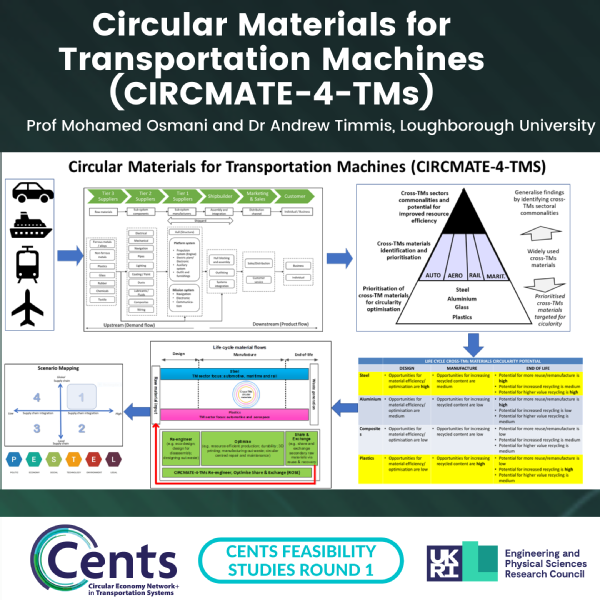 |